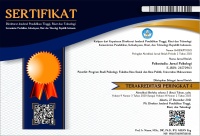Pengaruh Sistem Reward Terhadap Work Engagement di PT.SVU dengan Keadilan Prosedural Sebagai Variabel Kontrol
Abstract
Keywords
Full Text:
PDFReferences
Anku, J. S., Amewugah, B. K., & Glover, M. K. (2018). Concept of Reward Management , Reward System and Corporate Efficiency. International Journal of Economics, Commerce and Management, VI(2), 621–637. Retrieved from http://hrmars.com/hrmars_papers/Analyzing_the_Effectiveness_of_Reward_Management_System_on_Employee_Performance_through_the_Mediating_Role_of_Employee_Motivation.pdf
Armstrong, M. (2014). Handbook of Human Resource Management Practice. Kogan Page.
Bakker, A. B. (2017). Strategic and proactive approaches to work engagement. Organizational Dynamics, 46(2), 67–75. https://doi.org/10.1016/j.orgdyn.2017.04.002
Bakker, A. B., & Albrecht, S. (2018). Work engagement: current trends. In Career Development International (Vol. 23, pp. 4–11). https://doi.org/10.1108/CDI-11-2017-0207
Bakker, A. B., Rodríguez-Muñoz, A., & Vergel, A. I. S. (2016). Modelling job crafting behaviours: Implications for work engagement. Nursing Concept Analysis, 69(I). https://doi.org/10.1891/9780826126825.0031
Baskar, & R, P. R. K. (2015). A Study on the Impact of Rewards and Recognition on Employee Motivation. International Journal of Science and Research (IJSR), 4(11), 1644–1648. https://doi.org/10.21275/v4i11.nov151549
Cummings, T. G., & Worley, C. G. (2009). Organization Development & Change. https://doi.org/10.1007/s13398-014-0173-7.2
Franco-Santos, M., & Gomez-Mejia, L. (2017). Reward systems. In Organizational Behaviour in Sport (pp. 72–82). Routledge. https://doi.org/10.4324/9780203131961-9
Gallup. (2017). State of the Global Workplace. Employee Engagement Insights for Business Leaders Worldwide.
Ibrar, M., & Khan, O. (2015). The impact of reward on employee performance. International Letter of Humanistic Science, 52(May), 95–103.
Jamieson, J. (2004). Analysis of covariance (ANCOVA) with difference scores. International Journal of Psychophysiology, 52(3), 277–283. https://doi.org/10.1016/j.ijpsycho.2003.12.009
Kahn, W. A. (1990). Psychological Conditions of Personal Engagement and Disengagement at Work. Academy of Management, 33(4), 692–724. https://doi.org/10.1108/EL-01-2014-0022
Larkin, I., Pierce, L., & Gino, F. (2012). The psychological costs of pay-for-performance: Implications for the strategic compensation of employees. Strategic Management Journal (Vol. 33). https://doi.org/10.1002/smj.1974
Luthans, F., Youssef, C. M., & Avolio, B. J. (2007). Psychological Capital : Developing the Human (9th ed.). New York, NY: Oxford University Press.
Made, N., & Rosmelina, A. (2020). META-ANALISIS : HUBUNGAN ANTARA KEPUASAN KERJA DAN ORGANIZATIONAL CITIZENSHIP BEHAVIOR ( OCB ). Jurnal Psikostudia Universitas Mulawarman, 9(1), 11–17. https://doi.org/http://dx.doi.org/10.30872/psikostudia.v9i1
Maulana, R. (2019). Jumlah Konsultan Besar Bidang Konstruksi Tumbuh Pesat, Ini Penyebabnya. Retrieved January 7, 2019, from https://ekonomi.bisnis.com/read/20190124/45/881930/jumlah-konsultan-besar-bidang-konstruksi-tumbuh-pesat-ini-penyebabnya
Mehmood, S. (2013). Managing Performance through Reward System. IOSR Journal Of Humanities And Social Science, 15(2), 64–67. https://doi.org/10.9790/0837-1526467
Nulipata, M., Sahrah, A., & Yuniasanti, R. (2019). Pengaruh restrukturisasi birokrasi organisasi terhadap kepuasan kerja pegawai 1). Jurnal Psikostudia Universitas Mulawarman, 8(2). https://doi.org/http://dx.doi.org/10.30872/psikostudia.v8i2.2751
Saks, A. M. (2006). Antecedents and consequences of employee engagement revisited. Journal of Organizational Effectiveness, 21, 21. https://doi.org/10.1108/JOEPP-06-2018-0034
Schmitt, A., Den Hartog, D. N., & Belschak, F. D. (2016). Transformational leadership and proactive work behaviour: A moderated mediation model including work engagement and job strain. Journal of Occupational and Organizational Psychology, 89(3), 588–610. https://doi.org/10.1111/joop.12143
Stachowska, S. (2016). The role of remuneration in building employee engagement. World Scient Ific News, 57, 503–512.
Sun, L., & Bunchapattanasakda, C. (2019). Employee Engagement: A Literature Review. International Journal of Human Resource Studies (Vol. 9). https://doi.org/10.5296/ijhrs.v9i1.14167
Zulistiawan, R. (2014). Hubungan Antara Komitmen Organisasi Dan Keadilan Organisasi Dengan Intensi Turn Over. Jurnal Psikostudia Universitas Mulawarman, 3(1), 12–23. https://doi.org/http://dx.doi.org/10.30872/psikostudia.v3i1.2243
DOI: http://dx.doi.org/10.30872/psikostudia.v9i2.3911
Refbacks
- There are currently no refbacks.
Copyright (c) 2020 Psikostudia : Jurnal Psikologi

This work is licensed under a Creative Commons Attribution-ShareAlike 4.0 International License.
Indexing by :
_________________________________________
PSIKOSTUDIA: Jurnal Psikologi Published by Faculty of Social and Political Siences, University of Mulawarman, Samarinda, East Kalimantan and This work is licensed under a Creative Commons Attribution-ShareAlike 4.0 International License.
_________________________________________
PSIKOSTUDIA: Jurnal Psikologi
Department of Psychology
Faculty of Social and Political Siences, University of Mulawarman
Jl. Muara Muntai Kampus Gn. Kelua Samarinda 75411
Phone: +62 813 35350368
E-Mail: psikostudia@fisip.unmul.ac.id




















